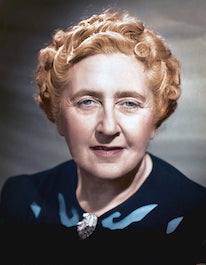The Mystery of the 'Agatha Christie Indult'
- K.V. TURLEY
Why did the best-selling author sign the petition to retain the traditional Mass 50 years ago?
 We have a mystery to solve.
We have a mystery to solve.
The suspect is none other than Agatha Christie: best-selling author and undisputed "Queen of Crime."
The mystery starts with a document composed in 1971. It came from the Vatican, where the then-reigning pontiff, Pope Paul VI, issued an indult permitting what was known as the Tridentine Mass to continue to be said in England and Wales.
What was striking about this document, which is generally only of interest solely to liturgists, was the fact that it came about as a result of a letter requesting the preservation of the traditional Mass signed by an eclectic list of notables, many of whom were not Catholic.
There were signatories to the letter, which was officially termed a "Statement by scholars, intellectuals, and artists living in England," who were to be expected, Catholic writers such as Graham Greene, Malcolm Muggeridge, Seán Ó Faoláin and David Jones. And there were also some from the British establishment whose signatures may equally have been anticipated: for example, that of the celebrated art critic Sir Kenneth Clark, of the then-Poet Laureate Cecil Day-Lewis, and academic and member of the Inklings Colin Hardie. But there were also the names of non-Catholics who would raise an eyebrow: the communist intellectual Philip Toynbee; Liberal Party leader Jo Grimmond; atheistic novelist Iris Murdoch; Jewish violinist Yehudi Menuhin; and libertarian philosopher Auberon Herbert, to name but a few.
In total there were 57 names attached to the letter that stated that its signatories were not preoccupied with "the religious or spiritual experience of millions of individuals"; instead, they wishes to highlight how "the rite in question, in its magnificent Latin text," had "also inspired a host of priceless achievements in the arts — not only mystical works, but works by poets, philosophers, musicians, architects, painters and sculptors in all countries and epochs. Thus, it belongs to universal culture as well as to churchmen and formal Christians." Their concerns regarding this rite were with what they believed to be "a plan to obliterate that Mass by the end of the current year." Therefore, the signatories of the appeal wished "to call to the attention of the Holy See the appalling responsibility it would incur in the history of the human spirit were it to refuse to allow the Traditional Mass to survive, even though this survival took place side by side with other liturgical forms."
This letter made its way to Rome and, ultimately, to the desk of the Holy Father. Then-Cardinal John Heenan, archbishop of Westminster, presented it to Pope Paul VI on Nov. 5, 1971.
As the story goes, the Pope read the letter and then looked at the names attached to it. When he spotted the name of the Queen of Crime, it is alleged he exclaimed: "Ah, Agatha Christie!" and promptly agreed to the letter's plea.
So the indult became known as the "Agatha Christie Indult." It allowed the bishops of England and Wales to grant permission for the celebration of Holy Mass according to the older form, not, albeit according to the 1962 Missal, but with the modifications to that rite introduced in 1965 and 1967.
Agatha Mary Clarissa Millar was born in 1890 at Torquay, England. Later known as Agatha Christie, the name she acquired through her first marriage, she would become a literary phenomenon. In fact, Christie's works have been outsold only by those of Shakespeare and the Bible. She has sold more than two billion books worldwide. To give some idea of the numbers here, if you took every copy of just one book and its sales in the United States alone and placed them end to end, the pile of 1932's Peril at End House would reach all the way to the moon. Unusually, she created not one but two celebrated literary detectives: Hercule Poirot and Miss Marple. Christie's prolific literary output — 66 crime novels, six non-crime novels and 15 short-story collections — was translated into more than 100 languages and spanned five decades from 1920 until her death in 1976.
For all that has been written about Christie, there still remain many mysteries about the woman herself. In December 1926, as her first marriage was falling apart and after a row with her then-husband, she left the marital home in Sunningdale, Berkshire. Police were called, and a national search ensued to find the author. Needless to say, the press had a field day with the missing mystery writer. However, her discovery 11 days later at a hotel in Yorkshire only added to the mystery. Questioned repeatedly, she could remember nothing of what had occurred in the preceding days. There was no evidence to be found of what she had been doing either, whether in terms of whom she had been with or even how she had managed to travel so many miles from her home. Her autobiography, published in 1977 a year after her death, is silent about this episode. It refers to her first unhappy marriage and desertion by her then-husband in a few lines: "So, after illness, came sorrow, despair and heartbreak. There is no need to dwell on it."
As was typical of her class and background, she was a woman who felt deeply but who said little. She was known for hating speaking in public. On being elected the president of the Detection Club, a position she held from 1957 until her death in 1976, she only agreed to assume the post on the condition that she would never have to make a speech. Like many writers, she was public property only on the page. From her second marriage to archaeologist Max Mallowan in 1930, it could be said that the rest of her life, outwardly at least, was unremarkable. When not in England, she traveled with her husband to his archaeological digs in the Middle East. Wherever she found herself, she wrote; and she published many books to the adulation of an ever-increasing audience, quietly becoming the best-selling fiction author of all time.
So what of the "Indult" and her part in it? What motivated her to sign the petition? On the website of the Latin Mass Society of England and Wales, there is a fascinating reminiscence by Alfred Marnau about collecting names for the "Indult" petition. He describes how he and others went about contacting the great and the good to support the petition. However, sadly, it sheds little light on what motivated the Queen of Crime to sign.
"…It was part of universal culture."
Speaking to the Register via email about Christie's involvement in the 1971 petition, Joseph Shaw, chairman of the Latin Mass Society of England and Wales, said, "Like practically everyone in the U.K. in 1971 who was blessed with an education and a social life, Christie was well aware of the Catholic liturgy: She would have experienced it at weddings and funerals, and Catholic beliefs and practices play a part in several of her stories. … It was part of universal culture." He went on to add, "This liturgy was widely regarded by outsiders as something not only distinctive but uniquely impressive. They would no more want it to disappear than the Pyramids or the Mona Lisa."
Fiorella de Maria is also crime writer; she has created the Father Gabriel mysteries series for Ignatius Press. She is also Catholic. So what does she make of Christie's involvement in the 1971 petition to the Vatican? "I find it very heartening that so many non-Catholics appreciated the beauty of the extraordinary form and its significance for English Catholics," de Maria told the Register. "I can't help but smile thinking of the Holy Father recognizing Agatha Christie's name among the list of signatories. Well, she was the 'Queen of Crime,' and I sincerely hope her books adorned the shelves of the papal residence." As to why the most famous crime writer of all time put her name to this document, de Maria responded by acknowledging the mystery: "I have always found Christie's religious sentiments difficult to pinpoint, though her Catholic characters are usually positively drawn, which was not usual then or now."
More than the average Briton, Christie would have had some familiarity with the liturgy of the Church. She was married to a devout Catholic and no doubt attended Holy Mass with him on occasion. She was aware of the world around her and, through the good offices of the Latin Mass Society, doubtless knew of the desire by some English Catholics to preserve the Tridentine Rite. Was it, perhaps, simply that? She desired to be party to a plea to preserve something of reverence and beauty and felt solidarity with that even if not sharing the belief in its sacrificial and salvific character?
Maybe, however, as in the best detective stories, there is a piece of evidence in plain sight.
Christie was a devout, if very private, High Anglican. In 1926, around the time of the painful episode of her first marriage ending, Christie's mother, Clarissa, to whom she was devoted, died. One of her mother's effects was to sit by the writer's bedside for the rest of her life, namely, a copy of the Imitation of Christ. Written by Thomas à Kempis, the 15th-century devotional masterpiece regarding the inner life is divided into four parts. Book One emphasizes the need for solitude and silence and a withdrawal from the world; Books Two and Three develop this theme but speak also of the interior consolations of this withdrawal. Book Four is different. It is devoted to the Blessed Sacrament and is written in the form of a dialogue between the soul and its Savior. Could these mystical exchanges have influenced Christie in her appreciation of the Holy Mass and, therefore, her sense of the need to preserve its ancient liturgical form?
 This is Meaghen Gonzalez, Editor of CERC. I hope you appreciated this piece. We curate these articles especially for believers like you.
This is Meaghen Gonzalez, Editor of CERC. I hope you appreciated this piece. We curate these articles especially for believers like you.
Please show your appreciation by making a $3 donation. CERC is entirely reader supported.

Acknowledgement
 K.V. Turley. "The Mystery of the 'Agatha Christie Indult'" National Catholic Register (Noovember 5, 2021).
K.V. Turley. "The Mystery of the 'Agatha Christie Indult'" National Catholic Register (Noovember 5, 2021).
Reprinted with permission.
The Author
 K.V. Turley is the National Catholic Register's U. K. correspondent.
K.V. Turley is the National Catholic Register's U. K. correspondent.




